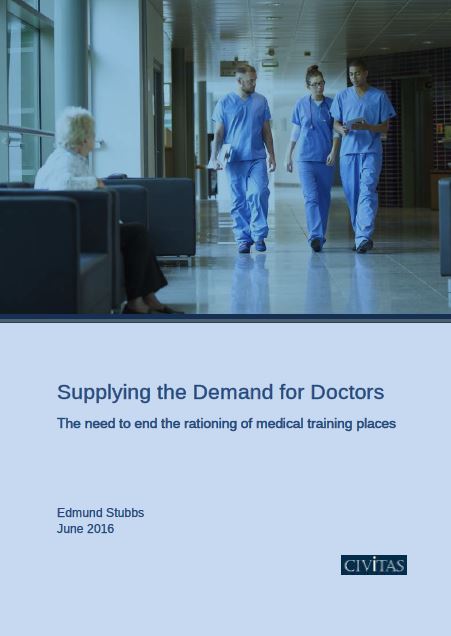Supplying the Demand for Doctors: The need to end the rationing of medical training places
Edmund Stubbs, June 2016
The NHS is under strain like never before and its woes are rarely out of the headlines for long. Alongside the host of other issues that the service must confront, like a funding blackhole, it also faces severe recruitment problems. Vacancy levels for permanent positions are high, especially in unfavourable specialties such as A&E and in remote parts of the country. This has left the service dangerously reliant on overseas recruitment to fill staffing gaps.
Each year the NHS is forced to recruit thousands of medical staff from abroad, often depriving much poorer countries of their much needed clinicians whilst still sourcing medics from staffing agencies to fill vacant shifts.
Despite this severe shortage of doctors, the government restricts medical school places to just over 6000 per year and, to exacerbate the problem, a proportion of newly trained doctors leave the NHS upon graduation to work for staffing agencies, private providers or to work abroad.
There will be a particularly marked shortage in the next generation of recruits going into GP practice, a worrying development for the future of primary care.
So what can be done to ensure a sufficient number of doctors for the future? In this report, Civitas Health Researcher Ed Stubbs proposes that instead of Health Education England (HEE) making upfront payments for the training of its medics (via bursaries, fifth year tuition fees and clinical placement fees), medical students should be required to take out a loan from the Student Loans Company to cover the total cost of their training; thus transferring the NHS’s immediate training costs to an asset on the Department for Business, Innovation and Skills’ balance sheet.
The eradication of upfront payments by the NHS would mean the current cap on the number of doctors training each year could be lifted and the UK could finally train the number of doctors it needs. Importantly, such a training loan would be repaid on behalf of each medic by the NHS through HEE on condition that doctors work for the NHS after graduating. If graduates leave the country to work abroad or transfer from the NHS into the private sector they would become liable for the repayment of these loans.
Stubbs points out that another problematic element of current recruitment practices is that foreign students are given their placement fees (at £34,000 per placement year); the same as any UK national student. These fees come out of the NHS’s training budget, meaning the NHS is paying up to £12 million per year for overseas students to study here with no guarantee that they will stay beyond the end of their studies. The proposed placement fee loan would ensure that such students either remain and work for the NHS after graduation or fully pay back their placement fees if they wish to return home.
It is only by looking to the radical solutions proposed in this report that we can expect to solve the recruitment crisis facing the NHS.
In the Media
Doctors should be forced to pay £130k bill if they quit the NHS, report suggests, Telegraph
Replace doctor trainee bursaries with loans, think-tank recommends, Pulse News

About the Author
Edmund Stubbs is Healthcare Researcher at Civitas. He studied Biomedical Science at the University of Sheffield and has a Master’s degree in Health, Population and Society from the London School of Economics and Political Science. Edmund also worked as a healthcare assistant for four years at Addenbrooke’s Hospital, Cambridge, and as a
freelance health consultant for one year.

